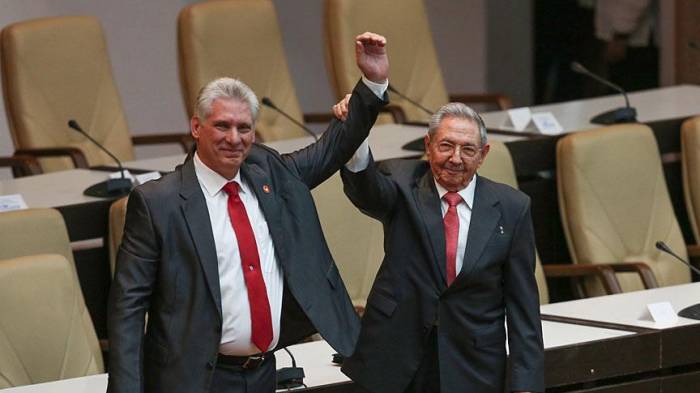The son of a teacher and a mechanical plant worker, he was only two years old when the Cuban missile crisis erupted and seven when Che Guevara was executed at a schoolhouse in La Higuera, Bolivia.
He graduated from the Central University of Las Villas in 1982 as an electronics engineer and joined the Cuban Revolutionary Armed Forces, where he served until 1985. He then became a prominent teacher at the Central University of Las Villas and an important figure in the Union of Young Communists (UJC) in his hometown.
From 1987-1989, as first secretary of the UJC, he traveled to Nicaragua to complete a government-run mission to support the country’s socialist revolution.
Upon returning to Cuba, he became a leader of the UJC in Villa Clara, of which he became a member of the National Committee. In 1991, the year in which the Soviet Union collapsed, Diaz-Canel joined the Central Committee of the Communist Party of Cuba and in 1993, he was appointed as second secretary of the UJC National Committee.
In 1994, when Cuba began emerging from the economic crisis stemming from the Soviet Union’s collapse, Diaz-Canel became the first secretary of the Provincial Party Committee in Villa Clara and promoted important cultural reforms, including support for the first cultural center to offer transvestite shows in Cuba.
In 2003, a year after the failed coup against President Hugo Chávez in Venezuela, he was named first secretary of the Communist Party of Cuba in Holguín and proposed by Raúl Castro himself to belong to the party's political bureau.
Between 2009 and 2012, he had the opportunity to serve as Minister of Higher Education. Then he replaced the Hero of the Republic, José Ramón Fernández, as vice president of the Council of Ministers in the areas of education, science, culture and sport.
In the closing speech of the constitutive session of the VIII Legislature of the National Assembly of People’s Power of Cuba in 2013, when Diaz-Canel was first vice president of the Councils of State and Ministers of Cuba, Raul Castro referred to the political transition on the island:
"We believe that in the circumstances that the country is living and has been forced to develop for more than half a century of the Revolution, executive unity should be guaranteed at the peak of state and governmental power in the face of any contingency for the loss of the top leader in a way that the continuity and stability of the nation is preserved without interruptions of any kind."
This is how Diaz-Canel became the first leader born after the revolution to reach that position, which made him number two in the Cuban government and the successor of Raul Castro. On April 18, 2018, he was designated as the sole candidate for head of state.
- Challenges of the transition
"The transition represents an act of continuity, consolidation and defense of the project of the Cuban Revolution," said Diaz-Canel.
The political transition in Cuba did not begin with Diaz-Canel occupying the position of head of state. It began in 2006 when Fidel Castro "provisionally" delegated Raul to take over the government.
The Castro brothers have always been clear that without an orderly generational change that is gradual and within the institutional framework created by the revolution, it will not be able to survive. And the new president will have to make sure that this continues to be the case.
In this sense, Castro will be of great help when dealing with the old guard of "historical" generals who also occupy positions in the party and government, where Diaz-Canel has good relations but where he has not so much power.
The new president will have to take advantage of his austere image, his closeness to the people, his ideological firmness and pragmatism to consolidate the conquests of the revolution and continue the economic, migratory and political reforms initiated by Raul Castro without risking the socialist model of the island.
In this sense, before the partial opening of the island to the internet, the successor of Raul Castro has already called for permanent dialogue with the new generations to "empower them with the ability to discern valuable and true information among the avalanche caused by new technologies”.
In addition, Diaz-Canel has publicly acknowledged the need to transform the island's press but to remain "faithful to the revolution" and continue to help build socialism.
Diaz-Canel will have to face many challenges. However, the most important will be to resist again a period of great hostility from the United States and its political propaganda.
On March 11, 2018, when parliamentary elections were held, Diaz-Canel emphasized the need to maintain the strength of Cuban political processes "above all in a context of continuous aggression and deterioration of relations with the United States, the product of an administration that offends Cuba and approves measures that harm millions of Cubans and Americans".
More about: Cuba
















































